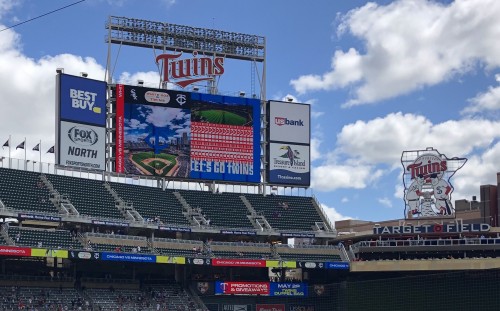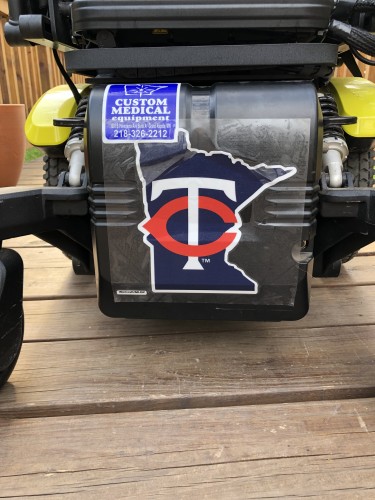The Minnesota Twins, the Boys of Summer, and a Glimpse of the Reign of God
I fell in love with the Minnesota Twins, and therefore fell in love with baseball, at the exact same time that I first fell in love at all.
In fact, given that I have absolutely no athletic ability whatsoever, it is not a far stretch to imagine that I fell in love with the Twins and baseball precisely because I fell in love.
I don’t know what else would have gotten me to the ballpark except for the promise of my hand being held by a boy who held my heart too.
Before this particular boy entered my world, I’d never entered a baseball stadium ever, except to go to the one at Carson Park, in Eau Claire, Wisconsin, but that was just for the annual outdoor service held by the church my father served as an associate pastor at the time.
I imagine that both loves were aided by the fact that at the time, in my mid-to-late teens and early 20s, the Twins were on their late-80’s/early ‘90s winning streaks, with the likes of Kent Hrbek and Kirby Puckett sending out the hits and bringing in the runs and the World Series Titles.
It also didn’t hurt that my high school love was Lutheran, and handsome, and stole my heart the way Dan Gladden stole bases, sent kisses my way as finely as Bert Blyleven pitched his ball straight across the plate, and was as dependable a presence in my young life as shortstop Greg Gagne was in all of our lives, standing out on that field.
Truth be told, there isn’t a single Twins game I watch without thinking of those days, days that are precisely what Van Morrison had in mind when he crafted what is perhaps the best summer love song ever, “Brown Eyed Girl.”
~~~~~~~
This year, my kids have gotten into the game, and are now officially as fiendish about the Twins as am I.
My daughter Else is as old as I was, back in those halcyon days, so it is a bit mind-bending to watch her leaning into those squeaker-innings like I did, and do.
But E is learning the lingo, and when she doesn’t know the rules, she looks them up to learn, and wields that info like a pro while we are all munching our routinely home-made Cracker Jacks, which we gnaw on every game when we aren’t doing the same to our nails.
She’s my resident Dick Bremer.
And Karl, 18, traumatic brain injury be damned, he knows when our boys are up to the plate, and he knows when to say that we need a home run (sometimes desperately), and thanks to our five years in Regensburg Germany, he knows when the moment calls for a resounding “Scheisse!”, and though he can’t jump up when we get a run like his sister and I do, he beams his grin which is just as good if not better a celebration.
A friend of mine, Pastor Matt Steinhauer, stayed at my Spent Dandelion Theological Retreat Center a few weeks back. He knew something of my love of the game, and so brought up this book by his friend Robert Benson: The Game: One Man, Nine Innings, a Love Affair with Baseball.
It’s a great read: lolls around like most of a baseball game does (in the book, he quotes that saying by Ray Fitzgerald, lover of baseball, who said, “A critic once characterized baseball as six minutes of action crammed into two and one-half hours” [28].)
But that’s part of the ambiance, the personality, of the game, right?
Baseball is less about a constant rush, is not about adrenaline fixes demanding regular top-offs, but is instead more about just showing up, about paying attention, and about being at the ready for the occasional thrill of those double plays, the exhilaration of glorious line drives, and the bask in the glory of the noble home runs.
That’s not to say that fans object to a series of pellmell cracks over the fence (I’m looking at that gorgeous win over Kansas City on Aug 3, thank you very much, where Nelson Cruz got 3 homers, sailed over the line in the same game as Jorge Polanco and CJ Cron offered a couple of their own to the sky by and by).
But while we all hope for those, much of baseball is not that.
Much of baseball is an unglamorous E for Effort at the plate, a slow pop fly hit or caught, a patient waiting for a batter to be either walked or struck out or maybe just maybe to hit that grounder that’ll be so unexpected and fast it’ll be missed by the pitcher who will inevitably reach for it, to no avail, and who will then turn to see the ball do everything short of wave as it passes on by.
Cue the obvious analogy to life: it’s mostly about showing up, and then expecting or hoping for a bit of lively drama injected into what is otherwise somewhat…routine.
But that low-hanging-but-still-bittersweet-fruit truth aside, here’s something else I’ve been thinking about, now that we Twins fans are somewhat in a wince-inducing “much of baseball is not that” phase of the Twins season.
True baseball fans, like the kind who buy their tickets and proudly wear their gear even in down periods, down seasons, down decades, true baseball fans still show up.
We might groan at the pitches so far to the East that they land in Wisconsin, the dervish-like swings that miss all but the dust they stir up, the coulda-caught-it-with-your-eyes-closed dropped flyballs, but the fact is, no loss is ever just due to one person, and deep down we know that.
We might point to one Boy of Summer with one hand while smacking our forehead with the other, but still, we know that, generally speaking at least, no game is ever entirely lost just because of one play, or one player.
We don’t say, for example, “Player X lost.”
We say “The Twins lost.”
In fact, we might even say, “We lost,” even if “we” weren’t ever on the field.
It’s a collective loss, a collective “Scheisse.”
It’s that ‘collective’ responsibility—both for wins and for losses—that I find interesting.
Outside of the game, when some event brings about or notes Life, even the passing of it, we do so with a communal marking, and we throw open doors: wedding receptions and birthday bashes and baby showers.
Even funerals are most often held with other people who grieve, or who care about those who are.
But when we drop the ball, so to speak, gosh do we do that either in isolation, or we are left in isolation.
Suddenly the collective interplay becomes the individual error.
Think divorces.
Think addictions.
Think arrests.
Think garden-variety poor choices.
In these sorts of occasions, then it’s awfully clear that “Player X struck out.”
There is rarely an acknowledgement of team responsibility, of compounding events, of the awareness that the ratio of good at bats to lousy at bats is about the same.
As Benson points out:
“Generally speaking the team that wins its division in the major leagues will win somewhere in the neighborhood of 85 to 95 games in the course of the season. The other side of that statistic, of course, is that these winners will have managed to lose between 67-77 baseball games. You may be winning every other day, but you are pretty close to losing every other day too.” He goes on to note that in one season, after 150 games were in the books “one could check the statistics for the top home-run hitters in the majors and discover that two of the top five were also in the top five in strikeouts….‘Every pitch is a potential home run,’ said the pitcher Preacher Roe. That is true, but every pitch has more potential to be a strikeout or a double-play ball or a pop fly to left.” (86-87).
So who, I ask you, among us hasn’t dropped a ball, hasn’t swung and missed in a critical inning, hasn’t committed an error of epic proportions?
At least we’re out there, one could say.
So sure, we all strikeout, sometimes quite gloriously.
And yet, if you’re not a player, if you are just like rest of us mere mortals, never putting foot to field but only swinging foot out of bed to a regular life, you, we, are often left to our losses alone, because our actions, or lack thereof, in down periods, down seasons, down decades, are deemed undeserving of patience, support, or public allegiance.
What’s most remembered are our really bad plays.
That’s messed up.
I think more of us need to go to more baseball games to be reminded of some humility and some humanity.
Benson points out something else, though, something else that up and reminds me of Orthodox worship: in certain expressions of that liturgical tradition, see, no one is ever late or leaves early.
There’s a common understanding that God is being worshipped all of the time, even when we aren’t in church. So there are always people in the sanctuary, and there are always people who aren’t there, and yet God is being worshiped all the time all the same.
Even during worship, there’s a line of people coming, and a line of people going, and it’s all good.
Benson writes something that smacks of the same. It’s baseball’s version of the Communion of the Saints, in a way. He reminisces:
Every time I stand in line at a ballpark, I am aware of the people who have stood in such a line before, and of the people who are somehow still standing beside me. There are my childhood friends Ricky and Nicky and the rest. There are my brother and my dad. Coach Taylor, who taught me how to play in the days when I thought I would be the next great Yankee infielder. I think of lying on my back on the hook rug in my grandfather’s living room watching the Game of the Week on black-and-white-television and learning to say “Podna” with Dizzy Dean and Pee Wee Reese. I remember watching the World Series on television at school, back in the days when the Series was played in the sunlight and teachers were following it as well. I remember the stickball games played with broomsticks and tennis balls, teh ones that we used to play on camping trips with families who’s fathers were named Henry and Billy and Joe….
I remember arriving before batting practice began and standing in the line at the gates to get into Coors Field in Denver on a hot summer afternoon the year that the ballpark opened. And I remember the long line of cars trying to get into the parking lots of Camden Yards in Baltimore and Dodger Stadium in Los Angeles. I remember the line of Yankee fans on the steps coming down from the elevated train in the Bronx, and the lone line of people that stretched out along the sidewalks that run down the hill to Turner Field in Atlanta.
Every line is different and every line is the same. (18-19)
Every line is different, and every line is the same.
If that isn’t the Communion of the Saints, well then I’m a Milwaukee Brewers fan (bless their hearts).
~~~~~~~
I’m not the first one nor will I be the last to notice that going to a baseball game is like going to church. We may believe in different teams/congregations/denominations, but we all go to worship just the same.
We’ve been going to the cathedrals for years and years, and we’ll keep going for years and years to come. Outfits change, rules even change, but the love of the game and the crowd and the Cracker Jacks don’t.
Baseball even has saints, those who are the best that baseball offers up, and while we might all hope to be one one day, most of us just stand in wonder and awe before them, inspired by their stories, encouraged that maybe, just maybe we could be sort of like them one day, and in the ordinary (and reality-grounded) meantime, we are simply reminded of the incarnate beauty of the best of the game that we get to see in living, breathing motion.
In some ways, you see, baseball is what church, what a believer, aspires to be.
You struck out? Go on, sit down, come on up to bat again in a spell. Maybe you’ll do better. Maybe you won’t. But you’re still welcome on the plate again, regardless, again and again.
Getting tired on that mound of yours? Well done, good and faithful servant. You go take a rest now. Someone else has got it from here on out.
You sick and tired and hurt? You seem like a good candidate for the Injured List. Sit down, we’ll help you heal, and meanwhile, others have it covered.
You committed an error for all to see? Who hasn’t, I ask you. So, yeah, we’re mad. But we’ve got your back. We’ll come back. We’ll cheer you on again, because although we know that your stats won’t ever shake that blunder, your stats are more than that blunder too.
~~~~~~~
This August the 25th, the bottom of the summer’s 9th, I’m taking my two kids and my father to one last Minnesota Twins game. It’ll be their second ever, and my father’s first.
The kids and I, along with our Danish exchange student, went to a game this past May.
Twins against the White Sox.
We won.
I made the tickets while crossing my fingers and breathing a bit faster, less about pre-worrying about who would come out on top.
Instead, I was awfully fretful about accessibility.
Now, I’m not saying that Target Field is heaven, but I am saying that the place is as accessible a place as a person in a wheelchair could hope for, this side of those cloud-born turnstiles at the divine stadium entrance.
Ahem.
I mean of those heavenly, pearly gates.
We had a special entry point, adapted security measures, designated escorts: I seriously felt as if we were VIPs—and why wouldn’t we be? Karl can’t wait to tell his class about his home run he struck in this summer’s Miracle League.
Else and I have decided that this time, we might try paying more intentional attention to stats by way of grabbing a scorecard.
Being that we will be sitting smack dab beyond Left Field, we’ve also decided to be hopeful and bring a mitt along, just in case.
As for today, though, as on every day that the Twins play, the three of us, plus our two hounds, will be sitting in front of our TV.
On the wall next to each side of our TV—really only used for watching the news and playing the Wii with Karl and cheering on the Twins—is a pennant and two Homer Hankies: turns out that my late mama, who was a flag maker, was spotted at the Renaissance Festival in the late 80’s by someone or another affiliated with the Twins. She didn’t so much know a baseball from a soccer ball, but was thrilled anyway to be asked to make two 8’ x 8’ Homer Hankies, during their Series streaks, one of which ended up hanging over the Minneapolis Star and Tribune Newspaper building, and the other over the Metrodome. The one that flew over Star and Tribune building got stolen, and to her dying day, she was so proud that someone had her 8’ x 8’ Homer Hanky hanging in their fraternity or basement den.
Come pregame time, homemade Cracker Jacks in hand and mouth, Karl, Else, and I will gather around that TV, and eagerly watch for the Twins trotting onto the field.
Hopefully the Twins will trot off of it with a win.
I’m a bit fearful that this season, they’re going to break my heart like that first boy did years ago, and like most every one since then, come to think of it.
But if they do, I will forgive them.
I’ll be back.
And so will they.
And who else do I need, anyway?
I have my son, I have my daughter, I have my father, I have my two hounds, I have gratitude and grins that far outweigh any regret and remorse about the loss of those sweet young-love-and-young-life days, I have Van Morrison, and I have the Communion of the Saints, those folks who not least of all loved, love, and will love the boys of summer (almost) as much as I do.
And I have tickets to see the Twins with my family one more time this season.
It is enough.
(P.S. Is it coincidence that the logo of my favorite wine almost mirrors the logo of my favorite team? I think not. A sign of something, if not the reign of God, the way I look at it.)
~~~~~
My new book, I Can Do No Other: The Church’s New Here We Stand Moment, published by Fortress Press, can be pre-ordered here.
In it, I make the case that while justification was the key matter of Luther’s Day, social justice is the key matter for ours.
Both delving into and departing from Luther’s framework, and by exploring historical and present-day expressions of righteous opposition to such blights as slavery, Hitler, white supremacy, patriarchy, religious bigotry, homophobia, xenophobia, and lack of concern for the earth, I seek to find both means for resistance and reasons for hope, grounded in the gospel that announces freedom, welcome, and life.
The reviews are in, and while I may not be worthy of them, I sure am thankful for them.
“Rev. Dr. Anna Madsen has a unique, prophetic voice as a Lutheran theologian. With passion and erudition, she brings Martin Luther’s liberating discovery of grace as a charge for Christian communities today to make justice happen, with hope embodied. ‘Our God is revealed in every move we make, and people are watching.'” –Kirsi Stjerna, Pacific Lutheran Theological Seminary
“Anna Madsen’s work is an unfolding wonder to me; her deeply spiritual reflections on very real issues in life and society hit me sometimes like a prophetic slap–and yet, beneath the critique and the concern for real human sin, the whisper of God’s mercy and love can always be heard. I am grateful for all I have learned–and continue to learn–from her.” –The Rev. Dr. Guy Erwin, Bishop of the Southwest California Synod, ELCA
“Rev. Dr. Madsen has gifted us with a systematic response to this divided, tragic, beautiful world, to her own personal tragedy and how it affected everything, and the call that Christians desperately need to hear right now to truly practice ‘justice and peace in all the earth.'” –Rev. Beth Birkholz, Holy Cross Lutheran Church, Livonia, MI
“In the word’s of Habakkuk 2:2 paraphrased, write it down, make it clear and run with it. That is exactly what Anna Madsen has accomplished in this book. Anna has connected the dots across time and space to help individuals and the Church to continue to reform. The church today is not our grandparents’ Lutheran Church (The church for that time served as called by God). The church of today is called to address the current issues facing the least of these, through the Gospel of Jesus The Christ.” –Rev. William C. Hamilton Jr., pastor St. John’s Lutheran Church, Jacksonville, Florida
“Anna Madsen was able to take ‘what we’ve heard and learned’ from Sunday School, Catechism, sermons, conversations and Bible studies, and expound her theological thoughts, in such a way, that will help those who read this, take pause and reflect on a wider view of possibilities. A seasoned learner or not so seasoned learner, is sure to get a broader sense of their own faith sense and practices as they help others to stretch their concept of God. Our challenge as disciples is to not always accept the status quo but to put our faith into action. Action in everyday life. I, personally, was moved by the concept of ‘The Anticipatory Church,’ and pray that somehow this is lifted as a vision of God’s possibilities.” –Rev. Victoria Hamilton, Jacksonville, Florida






